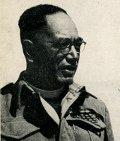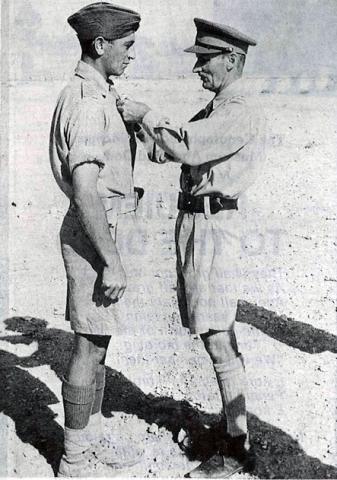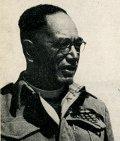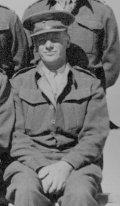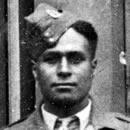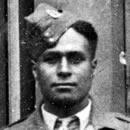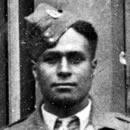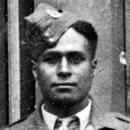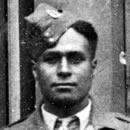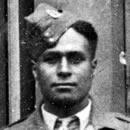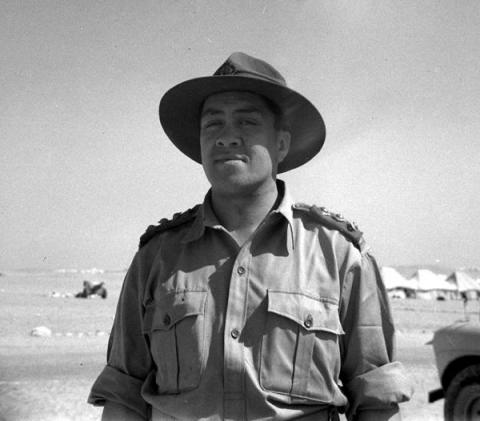<p>The Battalion were heading to Menastir, near the main Tobruk-Bardia road. They engaged with an advance guard of a German supply column. It was a difficult battle with the Germans suffering many casualties - many of which were taken to hospitals. At least one hundred were taken prisoner. In comparison the Māori Battalion suffered one death and four were wounded. The Māori Battalion returned to the barracks at Sollum. Colonel Dyer arrived to take command of the Battalion and on the 9th of December they left Sollum for Tobruk. The gift from the people at home arrived - mobile canteen, and tears fo joy flowed. Major Love has suffered a severe injury and is in hospital. The Battalion left Tobruk and Kroma on the 11th of December.<br /><br />This recording in Māori is part four of a fuller broadcast made by the Māori Battalion from Libya in 1941. </p><h2>Transcript<br /></h2><p>[Macrons are not shown as users have the advantage of listening to the recording to see which vowels require emphasis.] <br /><br />No te tahi o nga ra o Tihema ka haere atu matau ki Menastir ki te rori nui tonu i waenganui o Bardia me Tobruk. Ko te mahi o reira e whakaritea ma matou he tiaki taua rori kia kaua te hoariri e hoki whakamuri ki Bardia. No te toru o nga ra o Tihema ka tukua etahi o nga tamariki ki mua hei kanohi mo te ope nui ki muri. No te awateatanga ka hoki mai ratou me te korero kei te haere mai i te hoariri me ona mano. Ka haere te korero a te matua o te ope, "Tukua kia piri". He mea uaua tenei i nga pakanga o enei ra. Engari, i te mea kua Māori katoa nga apiha i tenei wa, kaati me whakamatau ki ta nga tupuna. Tukua mai ana kia uru rawa mai te hoariri ki a matou, katahi ano ka puhia. Tino mate te hoariri. Ka mahue nga mea mate, ka hoki muri nga mea ora, ka <em>noho ia</em> mai ano. No te wha o nga haora i te ahiahi ka kokiritia e te whanau ki te peneti. Ka mutu tena pakanga. E rua rau e ono tekau nga mea mate o te hoariri i <em>taea te tatau</em>. E kotahi rau e ono tekau ma rima nga mea i mauherehere. Nuku atu i te rau nga mea i tu, i mauria mai ki to matou hohipera. E kotahi tonu o matou i mate, e wha i tu. Ka pai ano ta nga tipuna whakahaere. I te wha o nga ra o Tihema ka hoki ano matou ki Sollum. No tenei wa ka taea ake tetahi o matou kaumatua a Colonel Dyer hei kaiarahi te ope. No te iwa o nga ra, ka mahue i a matou e Sollum. Hanga atu ki nga takiwa o Tobruk. I te rori ka noho matou ka whakanga mo te po kotahi. I te tekau o nga ra o Tihema ka tae ake te mobile canteen a te whanau e noho mai nei i te kainga ki roto ra no i te mura o te ahi. Ka korero i nga tuhituhi o runga, ka heke nga roimata. Tena koutou te whanau. No tenei wa ka pa tetahi mate taumaha ki a Major Love ka whakahokia ki te hohipera. Tekau ma tahi o nga ra ka mahue mai a Tobruk, ka mahue mai a Acroma. Atu o tenei wa, tae noa ki te mutunga ka riro ko te ope Maori ki mua. </p><h2>Translation<br /></h2><p>On 1 Decermber we went to Menastir via the main road between Bardia and Tobruk. The task given to us there was to guard the road thus preventing the enemy retiring to Bardia. On the 3rd December some of the boys were sent forward to reconnoitre for the Battalion. At dawn they returned with news that the enemy was approaching in great numbers. The order given by the CO of the Battalion was, "Allow them to come close." This is a difficult thing to do in modern warfare. However, because all the officers are Maori at this time, <em>well this was an opportunity</em> to adopt the way their ancestors fought. The enemy were permitted to come right into our positions, then we opened fire. The enemy suffered heavily. The dead were left behind while those who survived retreated and took updid well again because our ancestors officers were in control defensive positions again. At 4pm the Battalion attacked with bayonets. That was the end of that battle. Of those enemy who were able to be count ed 260 were dead, and 165 taken prisoner. More than 100 were woundedand taken to our hospital. Only one of our men died while four were wounded. <em>We did well again because our ancestors/officers were in control.</em> On the 4th December we returned to Sollum. At this time one of our senior officers, Colonel Dyer, was promoted to CO. On the 9th we left Sollum and headed to the region near Tobruk . We spenty a night along the road. On the 10th December the mobile canteen, from our relatives at home, turned up in the frontline. When we read the words [on the vehicle] tears fell. Thank you to our families. At this time Major Love is very ill and has returned to hospital. On the 11th December we left Tobruk and we left Acroma. From then until the end [of the Libyan Campaign] the Maori Battalion has remained the spearhead [of the 5 Brigade advance]. </p><p>[Editors notes - there is intermittent static throughout the sound file. Portions of the transcript in italics were difficult to transcribe or translate.] </p>
Media library
Audio
<p><strong>Sound file</strong> from Ngā Taonga Sound & Vision, ref: <a href="https://www.ngataonga.org.nz/collections/catalogue/catalogue-item?recor…;. Any re-use of this audio is a breach of copyright.</p>
<p>Image: M. L. Underhill et al., 1950, New Zealand Chaplains in the Second World War, War History, p.30</p>
<p><strong>The image shows Ben Porter receiving the Military Cross from Lieutenant-General Bernard Montgomery, commander of the Eighth Army in the Middle East</strong>. <br /><br />In part three of this broadcast Padre Harawira briefly discusses the Māori Battalion's taking of the Sollum Barracks in Libya where Major Harvey, a Pākehā <acronym title="Officer Commanding">OC</acronym> of A Company was wounded. He introduces Captain Porter who had received the Military Cross (MC) for his leadership during the campaign. Porter sends greetings to the tribes of North Auckland and acknowledges those soldiers from A Company who have fallen in battle. He gives his people an update on A Company including which officers are in charge of its three platoons.</p><h2>Transcript </h2><p>[Macrons are not shown as users have the advantage of listening to the recording to see which vowels require emphasis.]<br /><br />Padre Kahi Harawira: <br />No taua kokiri ano hoki ki Sollum i te rua tekau ma toru o nga ra ka tu a Major Harvey o A Company. Ka whakahokia ki te hohipera. Ka whakaturia ko Captain W Porter hei kaiarahi i tiana iwi a Ngapuhi. Koia tenei ka korero atu nei kia koutou. Captain W Porter MC.<br /><br />Captain Porter: <br />Paraire Paikea, Te Rerenga Wairua ki Tamaki, tena koutou. Tenei a koutou mihi kua tae mai kli te whanau morehu i puta mai i te mura o te ahi. Tena koutou i te whanau e takoto mai ra i nga mania o Ripia . E mihi ki a ratau, e tangi ki a ratau nga toto rangatira o te Apanui, Ngati Kahu, Te Rarawa, Ngapuhi, Ngati Whatua. I maringi mai ra ki tera wahi ki tera wahi nga uri o ratau tupuna. Ka nui te mamae mo nga matua, nga pouaru, nga pani, nga teina, nga tuahine o te hunga kua rironei. Kia ahatia? E hinga ana i te hinga a o ratau tupuna i te hinga rangatira kia tau ai te rangimarie ki runga i te mata o te whenua. Ma te Atua koutou e whakamarie i roto i o koutou pouritanga katoa. E kore ra e taea te korero te maia o te whanau. Kore rawa e whakahoki muri mai i waenganui i nga mea whakamataku o te pakanga. Kore rawa ratau i wareware ki te Kaihanga.Tenei honorekua uhia mai ki runga i toku tinana ehara na toku toa, engari na to ratau. Kua ki ano te kamupene i nga ope o muri nei. Ko nga apiha kei konei inaianei i tua atu i au ko Himi Henare, ko HenareToka, ko Hori Marsden. Ko Captain Urlich hoki raua ko Wordley kei te hohipera tonu, ratau katoa ko nga mea i tu.<br /><br />Ka nui to ratau pai. Tena koutou, tena koutou.</p><h2>Translation<br /></h2>
<p>Padre Kahi Harawira: <br />During that attack at Sollum on the 23rd Major Harvey of A Company was wounded. He was transferred to hospital. Captain W Porter was promoted to command his Ngapuhi tribesman (i.e. A Company). This is him about to speak to you - Captain W Porter MC. <br /><br />Captain Porter: <br />Paraire Paikea, Te Rerenga Wairua ki Tamaki (i.e. the people from the top of the North Island down to Auckland), greetings. Your well-wishes have reached the remnant of the family (i.e. survivors of A Company) who have returned from the heat of battle (i.e. Fighting in Libya). Greetings from the family who lie on the plains of Libya. We acknowledge them and weep for them the chiefly blood of Apanui, Ngati Kahu, Te Rarawa, Ngapuhi andNgati Whatua. The blood of the descendants of their ancestors is spilt in this place, in that place. We feel deeply for the parents, widows, [those who are now] orphaned, younger siblings and sisters of the group who have departed. What did they die for? They died the death of their ancestors, a chiefly death, because they gave their lives to ensure peace reigns upon the land. May God give you peace in all your grief.I cannot speak higly enough of the bravery of the family (i.e. A Company). They never retreated despitefacing the terrible dangers of war. Nor did they forget the Creator. This honour that has been bestowed upon me is notthe symbol of one man's bravery, but represents their bravery. The company has been brought up to full strength again by the reinorcements. The officers here now, who are in front of me, are Jim Henare, Henry Toka and George Marsden. Also Captain Urlich and Wordley are in hospital along with all those who were wounded. They are very well. Greetings, greetings. </p>
<p><strong>Sound file</strong> from Ngā Taonga Sound & Vision, ref: <a href="https://www.ngataonga.org.nz/collections/catalogue/catalogue-item?recor…;. Any re-use of this audio is a breach of copyright.</p>
<p>Image: 28 Māori Battalion Association. The Battalion Remembers booklet April 1984, p. 30.</p>
<p>Padre Capt Kahi Takimoana Harawira speaks from Libya 1941. He gives a brief update of the Māori Battalion's activities during November 1941 in Libya noting the death of Capt Parekura Tureia who was <acronym title="Officer Commanding">OC</acronym> of C Company. Both men were veterans of the First World War and considered pakeke (elders) in the Maori Battalion. <br /><br />This recording is part two of a fuller broadcast made by the Māori Battalion about the Libyan campaign and was primarily directed at the Battalions' people at home in New Zealand.</p><p>[Editors note - there is intermittent static throughout the sound file]</p><h2>Transcript </h2><p>[Macrons are not shown as users have the advantage of listening to the recording to see which vowels require emphasis.]</p><p>Ki nga iwi, ki nga reo, ki nga rangatiratanga e noho mai ra i nga marae o Aotearoa, te Waipounamu, tena koutou. Ko nga morehu enei o te Hokowhitu a Tu i waimarie ki te puta mai i te mura o te ahi o Ripia e mihi atu nei ki a koutou. Tena ra koutou i a Parekura Tureia me tana whanau e tiraha mai ra i runga i nga marae o Ripia. Tena ano hoki koutou i nga aitua o te kainga. Haere huihui atu koutou i kona i konei. Katahi tonu matou ka hoki mai. No tekau ma tahi o nga ra o Noema i hikoi atu ai o matou waewae ki roto i te rohe o te hoariri. No te rua tekau ma toru o nga ra ka piri te whanau i nga taua a Hitara raua ko Mussolini ki runga ki nga parepare o Sollum. No te kokiri tuatahi tonu, ka hinga tera o matou pakeke a Parekura. I hinga rangatira, i hinga toa, i te wa e arahi ana i tana iwi a Ngati Porou. Ka noho pani era o a matou tamariki. No reira, ka karangatia atu tenei o a koutou tamariki a Captain Charles M. Bennett hei kaiarahi i a ratou. A, nana a Ngati Porou i arahi tae noa ki te mutunga o tenei pakanga. Tenei ia ka korero atu ki a koutou. Captain Charles M Bennett. </p><h2>Translation </h2><p>To the tribes, spokesmen and leadership on the maraes in the North and South Islands. We, the remnant of the Maori Battalion who were fortunate to return from the Battle of Lybia, send greetings to you. We greet you with the sad news of the death of Parekura Tureia and soldiers of his family (i.e. Company) who died on the battlefields of Libya. We also acknowledge those who have died at home. Farewell [to the departed]l, may you gather together here and at home. We have just returned [to Egypt from Libya]. On 11 November [1941] our feet walked into enemy territory. On the 23rd the family (i.e. Māori Battalion) closed with the armies of Hitler and Mussolini on the heights of Sollum. During the very first attack, our elder Parekura was killed. His was a chiefly death, the death of a warrior, while he was leading his people of Ngāti Porou (i.e. C Company). Our children have been orphaned [i.e. troops in C Company are without a commander]. Therefore, one of your children has been promoted to lead them -Captain Charles M Bennett. Here he is to speak to you. Captain Charles M Bennett. </p>
<p><strong>Sound file</strong> from Ngā Taonga Sound & Vision, ref: <a href="https://www.ngataonga.org.nz/collections/catalogue/catalogue-item?recor…;. Any re-use of this audio is a breach of copyright.</p><p>Image: M. L. Underhill et al., 1950, New Zealand Chaplains in the Second World War, War History, p.30</p>
<p>Colonel HG Dyer was the commanding officer of the Māori Battalion after Colonel Dittmer was wounded at Sollum in November 1941. In this recording Colonel Dyer congratulates the Māori Battalion for their efforts in the Libyan campaign. He speaks about the reputation of the Māori Battalion, friendships forged with other units that they have fought with and remembers those soldiers lost in the campaign.</p><p>This recording is part one of a fuller broadcast made by the Māori Battalion about the Libyan campaign in 1941.</p>
<h2>Transcript</h2>
<p>Your leaders will tell you of the brave things that your men did in Libya. You will proud, the Māori name has become terrible to the enemy. In the campaign we were of course helped by other New Zealand and English units and we have made some lasting friendships. We remember the Taranaki men who at Gazala went in to help the Ngapuhis. Our partnership with the Royal Horse Artillery was a happy one. Their cool courage and bold handling of their guns have endeared them to the Māori heart. Some of our bravest and our best have not come back. The day seems dark when we think of them. But they are not sad. They died as solders, honoured by friends and enemy. They have become an enduring part of your famous race. In years to come Māori men and women will hold their heads higher because of them.</p>
<p><strong>Sound file</strong> from Ngā Taonga Sound & Vision, ref: <a href="https://www.ngataonga.org.nz/collections/catalogue/catalogue-item?recor…;. Any re-use of this audio is a breach of copyright.</p>
<p>Corporal
T.G. Bain a driver for the New Zealand Divisional Ammunition Company recounts his experience evacuating from Greece on the evening of 24 April 1941. In the confusion of the evacuation he is
searching for a lorry lost from his convoy.
He witnesses the <a href="/photo/sinking-hellas-anzac-story" title="The sinking of the Hellas"><em>Hellas</em></a> burning at the port of Piraeus. A number of New Zealanders, including Māori Battalion soldiers, were among the yatch's victims. During his search he meets the rear guard of the Māori Battalion. The Māori soldiers share a few comforts with him
then journey to the rendezvous point at Porto Rafti.
They find the lorry had made it through and in the early morning of 25 April they all evacuate safely to Crete. </p>
<h2>Transcript</h2>
<p>We got
underway again, all was confusion in Athens
and it was getting quite dark. I was
leading in the first lorry when we came to a turn off leading to the
beach. I told the driver to pull up and
wait for the second lorry. We waited for
ten minutes but there was no sign of the second lorry at all. As I had been instructed that it was
imperative that we get the beach immediately, I sent the driver on down to the
beach with the first lorry load of men.
By this time it was quite dark. I
waited for two hours in that corner. Ambulance after ambulance, the Greek ambulances
of course, rushed past with the wounded from the bombed ship. But my other lorry failed to show up. I had grave fears about what might have
happened and I was debating about whether I should start walking towards Athens five miles away, when
coming from the direction of ?????
a vehicle appeared following an erratic course.
As it came closer I could see the kangaroo emblem on the mud guard - an
Australian lorry. In this we drove down
to Piraeus to
find out if the lorry had gone down there.
It was a nightmare drive.
Although the night was pitch black the whole of Piraeus seemed to be illuminated by the
burning ship, the victim of the dive bombers.
The port was absolutely deserted.
It was horrible, the burning ship.
God alone knows how many smouldering bodies below decks. I turned the lorry and got back into Athens. Round and round Athens I toured; no sign of the missing
lorry. It was then well after
midnight. I was all in, days and nights of incessant strain
were taking their toll. I felt lost and
apart from my two companions very much alone.
I had visions of the despicable Boch (i.e. Germans) rushing into Athens but I had to find that lorry. I pulled into the curb and got out to stretch
my weary limbs. Suddenly round the
corner there appeared the lights of four vehicles, obviously a small
convoy. As the leading vehicle came
closer I saw on the mud guard the immortal emblem the New Zealand
fern leaf. I can not describe just how I
felt as I yelled to the driver to stop.
I had contacted the rear guard of the magnificent Māori Battalion. A Māori officer jumped out of the
vehicle. "Kiwi?" he asked. "Nothing surer," I replied, "I am glad to see
you". I will never forget that Māori
officer. He was cool and calm even
though he too was lost. He could see
that I was more or less exhausted, out came his water bottle, then a cigarette
and a tin of bully beef. I explained my
plight and after finding that the Aussies knew the rendezvous for their party
we got them underway and debated the problem of my lost lorry. We decided that as I knew the way to beach
we'd better proceed there in the hope that the missing lorry had arrived there
and that the evacuation ships had not moved out. Luck was with us the lorry had got
through. We were safely embarked at four
in the morning. We were in the care of
the navy again despite dive bombers and all the hell concoction of Hitler and
his band of cut throats. And thanks to
the navy we arrived safely in Crete. </p>
<p><strong>Sound file</strong> from Ngā Taonga Sound & Vision, ref: <a href="https://www.ngataonga.org.nz/collections/catalogue/catalogue-item?recor…;. Any re-use of this audio is a breach of copyright.</p>
<p>Intelligence Officer Second Lieutenant Charles Bennett speaks about the campaign in Crete from their Garawi camp near Helwan (Egypt) on June 3rd 1941. He acknowledges the Cretans' hospitality and the British Navy who made possible the occupation and evacuation of Crete. He also pays tribute to the Māori Battalion and speaks of lessons learnt from this campaign. (See also the Battalion diaries for <a title="Battalion diary for May 1941" href="/node/37638" target="_blank">May 1941</a> and <a title="Battalion diary for June 1941" href="/node/37639" target="_blank">June 1941</a>.)</p>
<h2>Transcript</h2>
<p>The Commanding Officer and members of the Māori Battalion wish first of all to extend their heartfelt sympathy and their condolences to the relatives of those who were lost in the campaign in Crete. Secondly, we remember with gratitude the kindness with which our Cretan allies welcomed and supported us in their beautiful island home. Thirdly, we wish to pay a tribute to the British Navy for its efficiency, self sacrifice and courage which made possible the occupation of Crete and finally its evacuation. During this short but bitter campaign the Māori was transformed from a practically inexperienced soldier to a veteran. At Maleme, at Platanias, at Suda Bay, he measured his strength with the finest troops of the German Reich, the Jaegers of their mountain divisions and proved himself a match in the fierce hand to hand fighting that took place. It is to their credit that after days of continuous dive bombing and machine gunning of the most severe kind, followed by night after night of mountain marching when rations were on the ebb that both Pākehā and Māori could still call upon their inward courage and at the supreme moment draw their bayonets and close with the enemy. Our short experience in Crete has taught us three things, first of all aerial bombardment inflicts few casualties on people who take the proper precautions, no matter how horrible and intense the bombing may be. Secondly, the German scheme of attack appears to aim at spreading terror among the defenders by creating an inferno of noise and metal in the hope that the defenders will flee or surrender without fighting. And the last point is that determined and alert troops who endure this ordeal without flinching can, if they act vigorously inflict terrible casualties on parachuters and airborne troops who at the moment of landing are practically at their mercy. If Hitler were to walk through the valleys and hillsides of Crete today and were to see there the ghastly wreck of his aerial division he would surely pause before ever launching a similar attack again. That so many of our troops have survived maybe attributed to their discipline, their thorough training, their strong loyalty to each other and to the Battalion and to the kind providence which was undoubtedly watching over them. May I conclude with a few words to our own Māori people. E ngā marae maha o Aotearoa, kia ora koutou katoa. Tangi mai rā i o tātou aituā. Heoi rā, nā te wā āna mate. Kei konā, kei te kainga, kei a koutou o mātou whakaaro, o mātou aroha. Mā te Runga Rawa tātou katoa e manaaki, e tiaki. Kia ora, kia ora.</p>
<p><strong>Sound file</strong> from Ngā Taonga Sound & Vision, ref: <a href="https://www.ngataonga.org.nz/collections/catalogue/catalogue-item?recor…;. Any re-use of this audio is a breach of copyright.</p><p><strong>Image<br /></strong>Detail of <a href="/node/3910" target="_blank">Officers at Katerini</a><br /><a href="https://natlib.govt.nz/">Alexander Turnbull Library</a><br />Reference: DA-14231<br /> Permission of the Alexander Turnbull Library, National Library of New Zealand, Te Puna Mātauranga o Aotearoa, must be obtained before any re-use of this image.<strong><br /></strong></p>
<p>Sir Charles Bennett, Commanding Officer of the 28th Māori Battalion details the attack on Point 209; the deadly German artillery and the use of rocks as fake grenades by C Company troops.</p><h2>Transcript</h2><p>The Germans of course had a grandstand view of all this and they started their defensive fire right from the very beginning and then they started firing mortars over from their rear... their troops. We found out afterward it extended considerably...they were there in depth. So they had mortars behind them and these mortars had air bursters, these shells would come over, they'd burst just above the heads of our troops, and then the shrapnel would fly in all directions, ricochet off the rocks and cause very heavy casualties. And so, the battle continued, it was still daylight, 5 o'clock when the attack took place and by the time darkness came C Company was pretty close to the top of the hill, but they hadn't taken it.</p><p>When darkness came it provided cover for C Company men and they continued to fight the enemy at the top of the hill right through that night. At one stage they rang me and they said that they'd run out of hand grenades and did we have supplies down below and I told them no, that we had no reserve supplies. I said to them why not use stones, because the enemy can't tell the difference in the dark, because when big stones land they think it's a grenade. And so they did, it's in our history. I think there was a grin on most of their faces when they threw these stones over and they could hear the German's yelling and scattering in all directions thinking it was a hand grenade.</p><p>Well the battle continued all night, we hadn't driven the enemy off the top of the hill... I'm sorry we had, but they were just on the brow of the hill on the other side and we were on the brow of the hill on this side. But it was only literally a question of yards separating their troops from our troops that they fought through the night.</p>
<p><strong>Sound file - </strong>Extracts from Interview with Sir Charles Bennett, interviewer Jim Sullivan, recorded 31 March and 1 April 1993, commissioned by the Ministry of External Relations. <br />From the Alexander Turnbull Library Oral History and Sound collection, OHColl-0217-1. All rights reserved. Permission of the Library and the New Zealand Ministry of Foreign Affairs and Trade must be obtained before any re-use of this sound file.</p><p><strong>Image<br /></strong>Detail of <a href="/node/3910" target="_blank">Officers at Katerini</a><br /><a href="http://timeframes.natlib.govt.nz/">Alexander Turnbull Library</a><br />Reference: DA-14231<br /> Permission of the Alexander Turnbull Library, National Library of New Zealand, Te Puna Mātauranga o Aotearoa, must be obtained before any re-use of this image.<strong><br /></strong></p>
<p>Peter Awatere was the Commander of C Company when they were given the task of taking Point 209. Sir Charles Bennett, Commanding Officer of the 28th Māori Battalion describes the qualities of Peter Awatere and his particular style of commanding C Company.</p><h2>Transcript</h2><p>C Company under then Major Awatere who later in Italy became Colonel Awatere and became Commanding Officer of the Battalion in Italy. A very brave, courageous fighting man Peter Awatere, one of the best soldiers that the Māori Battalion produced. He was the Company Commander and I remember to this day, Peter Awatere and the way he commanded his Company.</p><p>The plan of attack for the Company of course was his concern, the Company Commander's concern, it had nothing to do with the Commanding Officer so I left it entirely to him. But he controlled almost like a parade ground manoeuvre. He had a whistle, and he had 3 platoons forward, all 3 platoons of the Company forward and when he blew one blast on the whistle this platoon would move 20 or so yards, 2 blast the middle one, 3 blast... and that's how he, not zig zagged, but that's how he made his way up this hill.</p>
<p><strong>Sound file - </strong>Extracts from Interview with Sir Charles Bennett, interviewer Jim Sullivan, recorded 31 March and 1 April 1993, commissioned by the Ministry of External Relations.<br />From the Alexander Turnbull Library Oral History and Sound collection, OHColl-0217-1. All rights reserved. Permission of the Library and the New Zealand Ministry of Foreign Affairs and Trade must be obtained before any re-use of this sound file.</p><p><strong>Image<br /></strong>Detail of <a href="/node/3910">Officers at Katerini</a><br /><a href="https://timeframes.natlib.govt.nz/">Alexander Turnbull Library</a><br />Reference: DA-14231<br /> Permission of the Alexander Turnbull Library, National Library of New Zealand, Te Puna Mātauranga o Aotearoa, must be obtained before any re-use of this image.<strong><br /></strong></p>
<p>Charles Bennett, Commanding Officer of the 28th Māori Battalion describes the traits of Te Moananui-a-Kiwa Ngārimu VC. As a member of his intelligence section Bennett explains that Ngārimu's particular qualities were such that he would defend his men, even at the cost of his own life.</p><h2>Transcript</h2><p>I knew Ngārimu well. I think I've already related that he was one of my intelligence section in Greece and in Crete. Ngārimu was, how shall I put it, an introvert; a very quiet kind of bloke; had very little to say, but very meticulous in his behaviour, in his appearance, always appeared well dressed, very careful about his appearance. Had little to say, well disciplined and a chap who was the kind of bloke that you can give an order to perform a certain job and you can take it for granted that that job will be done and done well.</p><p>So, I think briefly if you add all these qualities up I think you can see the qualities of a good soldier you know. Disciplined, obedient, fearless, no questions asked and doing everything to the best of his ability and I think it was not surprising that kind of... I have the highest regard for Ngārimu as I did for a number of others in my intelligence section, but it was not surprising that a man like Ngārimu should've been capable of winning a Victoria Cross in the end, because I should imagine when he was given this particular job to do by his Company Commander he did it even at the cost of his life.</p><p>I could see him standing up now, because his job was to defend the particular patch that he had and to defend his men and he did that willingly... quite prepared to die. Because he had been wounded, as the history shows, he had been wounded previously and I had tried to get him out to bring him out, but he said no, he didn't want to go, he wanted to be with his men, and he stayed with his men until he died, that's the kind of man he was...</p>
<p><strong>Sound file - </strong>Extracts from Interview with Sir Charles Bennett, interviewer Jim Sullivan, recorded 31 March and 1 April 1993, commissioned by the Ministry of External Relations. <br />From the Alexander Turnbull Library Oral History and Sound collection, OHColl-0217-1. All rights reserved. Permission of the Library and the New Zealand Ministry of Foreign Affairs and Trade must be obtained before any re-use of this sound file.</p><p><strong>Image<br /></strong>Detail of <a href="http://www.28maoribattalion.org.nz/node/3910" target="_blank">Officers at Katerini</a><br /><a href="http://timeframes.natlib.govt.nz/">Alexander Turnbull Library</a><br />Reference: DA-14231<br /> Permission of the Alexander Turnbull Library, National Library of New Zealand, Te Puna Mātauranga o Aotearoa, must be obtained before any re-use of this image.<strong><br /></strong></p>
<p>Sir Charles Bennett, Commanding Officer of the 28th Māori Battalion describes the wintery conditions atop Mt Olympus (Greece) where the Māori Battalion were camped awaiting the arrival of the Germans.</p><h2>Transcript</h2><p>I think all in all Greece in particular, and so was Crete, was a pretty unhappy experience for the whole of the New Zealand division. Although in some ways we appreciated the experience. We had leave in Athens when we first arrived and we took the opportunity of going up to the Acropolis and things of that nature and I enjoyed that experience very much. Our Brigade the Division, was pushed up into the North of Greece and the Māori Battalion took up a position on the historic Mt Olympus, right on the mountain itself. We were looking towards Salonika to the north and the Germans were supposed to come down from the Balkans or down that coastline somewhere and down into Greece. So, we took up a position in the Olympus Mountains and they were mountainous and it was winter time too. So that was not a very happy experience...and it's also memorable it's the first time we ever heard live bullets in actual warfare, was on Mt Olympus when the Germans attacked us. It was an uncomfortable experience up there, Mt Olympus. We lived in bivouacs, it was raining most of the time, and the country was hilly, no leave of any kind, we were stuck in our positions and waiting for the Germans to come down...</p><p> </p>
<p><strong>Sound file - </strong>Extracts from Interview with Sir Charles Bennett, interviewer Jim Sullivan, recorded 31 March and 1 April 1993, commissioned by the Ministry of External Relations. <br /><br />From the Alexander Turnbull Library Oral History and Sound collection, OHColl-0217-1. All rights reserved. Permission of the Library and the New Zealand Ministry of Foreign Affairs and Trade must be obtained before any re-use of this sound file.</p><p><strong>Image<br /></strong>Detail of <a href="/node/3910">Officers at Katerini</a><br /><a href="https://timeframes.natlib.govt.nz/">Alexander Turnbull Library</a><br />Reference: DA-14231<br /> Permission of the Alexander Turnbull Library, National Library of New Zealand, Te Puna Mātauranga o Aotearoa, must be obtained before any re-use of this image.<strong><br /></strong></p>
<p>Sir Charles Bennett, Commanding Officer of the 28<sup>th</sup> Māori Battalion emphasises the importance of the tribal and whānau composition of the Māori Batttalion Companies and how these familial ties contributed to the Battalion's considerable achievements.</p><h2>Transcript</h2><p>It was a very wise decision on the part of those who decided on this formation because it proved itself in war. These Companies were more or less family groups, whānau groups, so that every NCO belonged to the tribe and where possible the Officer himself was a member of the tribe. So that, both when they were out of war and when they went into war they fought as a group. Each one more or less very conscious of the fact that the chap next to him is a relation of his, a cousin or a brother or something like that. So that, I think they tenaciously fought to protect each other. There were many cases where chaps who were back in base, for instance when we were in Egypt, when we were in the desert, fella’s were supposed to be back in Egypt, in Cairo, in Maadi in base, you know because their brother or cousin was way up in the desert a thousand miles away about to go into battle. These chaps would find transport and get up to the Battalion, leave their safe head quarters and re-join their Company because their relations were there in battle and they wanted to be alongside them. I think that kind of tribal setup… whānau composition of the Companies and platoons of the Battalion had a lot to do with its achievement.</p>
<p><strong>Sound file - </strong>Extracts from Interview with Sir Charles Bennett, interviewer Jim Sullivan, recorded 31 March and 1 April 1993, commissioned by the Ministry of External Relations. <br /><br />From the Alexander Turnbull Library Oral History and Sound collection, OHColl-0217-1. All rights reserved. Permission of the Library and the New Zealand Ministry of Foreign Affairs and Trade must be obtained before any re-use of this sound file. </p><p><strong>Image<br /></strong>Detail of <a href="/node/3910">Officers at Katerini</a><br /><a href="https://timeframes.natlib.govt.nz/">Alexander Turnbull Library</a><br />Reference: DA-14231<br /> Permission of the Alexander Turnbull Library, National Library of New Zealand, Te Puna Mātauranga o Aotearoa, must be obtained before any re-use of this image.<strong><br /></strong></p>
<p>Canon Wi Huata talks about being a padre in Italy and his friend Henry Northcroft who was an officer in B Company. He describes how he divided his time between the different sections of the Battalion.</p><h2>Transcript (edited)</h2><p>I got there the end of the desert campaign, so I was mainly
a padre for Italy. That was my role. And then after working and talking... oh we
were meeting every day after training, we'd get together in the evening. It seemed to be we were having fellowship all
the time when we were in Maadi. Then
came the march ... we had to march a hundred miles from Cairo
to Alexandria
by night. Then we set sail for Italy. We arrived in a place called the Port of Taranto, and Henry [Northcroft] of
course he was an Officer in the Arawa and Tūhoe, B Company they call it. Henry was quite active in helping out, taking
prayers with his troops. And the way I
took prayers for them I had my programme set Monday for A, Tuesday for B,
Wednesday C, D Thursday, Friday Headquarters, Saturday Battalion Headquarters
and Sunday Battalion.</p>
<p>That's in peace and war.</p>
<p>Extract from Interview with Canon Wiremu Huata, interviewer Margaret Northcroft, recorded 25 June 1991. </p>
<p>From the collections of the Alexander Turnbull Library Oral History and Sound collection, OHColl-0291-1. All rights reserved. Permission of the Alexander Turnbull Library must be obtained before any re-use of this sound file </p>

